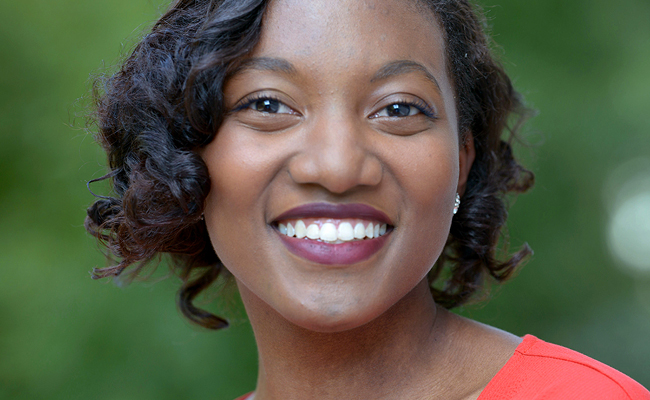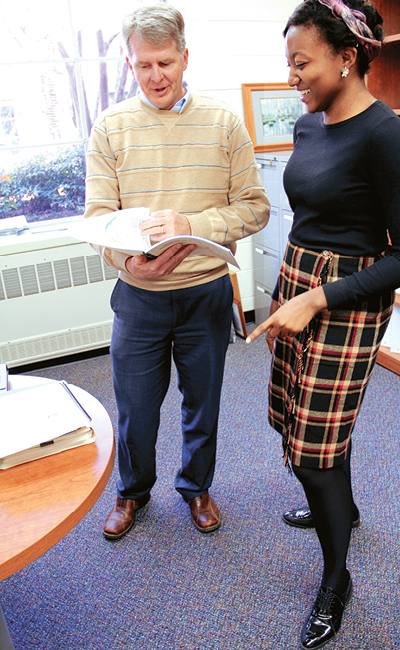
Gaby Pierre
A switch from solar nanotechnology to international city planning is giving recent UGA College of Engineering graduate Gaby Pierre the opportunity to find her true passion(s)
To say Gaby Pierre has done a 180-degree turn since she first stepped foot in a classroom at the University of Georgia would be downplaying it slightly. She has done several of them, spinning until she has found herself moving in a direction truer to who she is as a student, engineer, future city planner, dancer, and global contributor.
Before coming to Athens in 2013 as a Foundation Fellow and Honors student, she was determined to be a solar nanotechnologist. It sounded incredible—until she couldn’t reconcile the lab time with her need to interact with people.
“I really like people and talking to people, and I really like data,” she said. “I am both an analytical mind and an artsy mind, and I had to find a way to combine those. I fumbled into city planning, and it helped me reconcile two parts of me that I thought were irreconcilable.”
Now she is working on combined bachelor’s and master’s degrees—the first in environmental engineering and the second in environmental planning and design. Her goal is to become an international city planning consultant when she finishes her master’s in 2018.
From Jamaica to Athens
Gaby loves Southern accents almost as much as people love her Jamaican lilt. She laughs when asked how she ended up 1,172 miles away from her hometown of Kingston, Jamaica.
“I grew up in this international church,” she said, “and they have this teen camp outside of Athens called The Swamp; 90 percent of the counselors went to UGA. That’s why I applied to UGA. I ended up coming because of the Foundation Fellowship.”
Through the Fellowship, she stretched her global connections, traveling to New York City; Washington, D.C.; Cuba; South Korea; Costa Rica; and England and, while backpacking, visiting Italy, France, Germany, Switzerland, Czech Republic, and Luxembourg. She spent a month in Turkey doing city planning consulting for the municipality of Taskopru and nine weeks in Panama working for a research institute building a sustainable city in the Panamanian rain forest.
She also studied environmental economics at the University of Oxford and won third in the cha-cha at the Oxford Dancesport’s Cuppers ballroom dancing competition.
“I have been able to carve out my own path through the Fellowship,” she said, “and having the funding and support backing me has been really cool.”
A Driftmier collision
 “Are you really an undergraduate?” That was one of the first questions that popped into engineering professor Brian Bledsoe’s head when he met Gaby. They were waiting to heat up their lunches in the Driftmier Engineering Center’s break room.
“Are you really an undergraduate?” That was one of the first questions that popped into engineering professor Brian Bledsoe’s head when he met Gaby. They were waiting to heat up their lunches in the Driftmier Engineering Center’s break room.
“Gaby started telling me about her interests, and I invited her to stop by some time,” said Bledsoe, who is the UGA Athletic Association Professor in Resilient Infrastructure and, in October, started the Institute for Resilient Infrastructure Systems at UGA. “She immediately struck me as a critical thinker.”
Now, Gaby is an undergraduate research assistant in his lab, and they are working on a project looking at flooding, infrastructure, and resilience in Atlanta, Phoenix, Charlotte, and Baltimore.
“Part of our question is how can green infrastructures, the natural systems, work together with the built, or gray, infrastructure, the concrete and steel and all that, and our traditional storm water and flood plain management strategies,” Bledsoe said. “We are looking at these interactions in the context of trying to clarify what resilient cities and communities look like.”
Bledsoe, Gaby, and others are thinking beyond the traditional definition of resilience—basically, how long it takes a man-made system to go back to functioning at the level it was before something happened to it—and adding economic, environmental, and social resilience to their research.
Gaby is particularly focused on social resilience—the human side of infrastructure. She sees cities as meta versions of living and breathing organisms.
“It’s interesting how the solutions to problems, like flooding, aren’t just datadriven, because people, culture, and context matter, a lot more than we give them credit for,” she said. “You can have all this wonderful data analysis, but if you don’t design it for the people who are going to be living there, it’s not going to work.”
A salsa, a waltz, a foxtrot
Throughout her global learning, the one passion that has steadied Gaby is dancing.
She started when she was three, taking 14 years of ballet and five years of modern/ contemporary, jazz, and African/folk dancing. A masterful salsa done for fun during UGA’s international student orientation landed her an audition with the UGA Ballroom Performance Group. She is now president of the 50-member pre-professional dance company.
“I was skeptical at first because I had never really done anything quite like ballroom dancing,” she said.
Her Foundation Fellowship mentor, Rand Pope, was in the group and talked her into it. And now, “I don’t think I’ll ever stop dancing,” Gaby said. “There’s an indescribable moment when I’m performing a piece for the last time: the audience blurs, the adrenaline kicks in, just me, my partner, and the music. I leave my heart on the stage. It’s electric.”
The juxtaposition of Gaby Pierre
Gaby surrounds herself with what she loves—friends, dancing, research, books, Excel spreadsheets, the outdoors, Athens, and alone time.
She is an ambivert, according to her personality test, balancing at 51 percent extroverted and 49 percent introverted.
“I love quality time with my people but also love being alone, reading and hiking,” she said. “I really like dancing, but I also sketch for fun. I really like having friends over for tea and dinner.”
She’s a student ambassador for engineering and Honors, content head for energy and science at the Energy Concept, executive director and co-founder of Project Empathy, a member of the Blue Key Honor Society, a Peach State LSAMP Scholar, an Omotola Taofeqat Aderibigbe Engineering Scholarship Recipient, and a Classic Scholar.
She is glad to stay in Athens an extra year to finish her master’s degree.
“Athens is an excellent town,” she said. “I have truly loved becoming a regular at certain stores, coffee shops, and restaurants, knowing the owners by name, hearing about their lives and experiences, and participating in the volunteerism and community that makes Athens, Athens. When I go, I’ll miss that most.”

